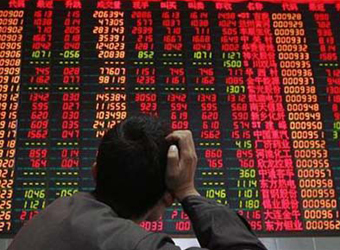Asian stocks edged lower on Thursday as investor confidence seen earlier in the week wavered overnight amid geopolitical tensions.
The Nikkei 225 eased 0.15 percent in the morning. The broader Topix was lower by 0.32 percent as its mining subindex gained 1.27 percent while the automakers and oil sectors slid.
Down Under, the S&P/ASX 200 shed 0.28 percent as gains in the materials and energy subindexes were offset by declines in most other sectors. The heavily weighted financials sector slipped 0.46 percent.
Hong Kong’s Hang Seng Index gave up early gains to edge down by 0.23 percent despite strength in the energy sector, which was buoyed by the advance in oil prices. Large cap financials were mostly lower.
Markets on the mainland also traded below flat line. The Shanghai composite slipped 0.6 percent and the Shenzhen composite was off by 0.25 percent.
Over in South Korea, the Kospi bucked the broader trend to edge higher by 0.2 percent. Shippers and most technology names gained in the morning, with Samsung Electronics up 0.78 percent.
MSCI’s broad index of shares in Asia Pacific excluding Japan declined, last trading lower by 0.35 percent.
Tentative moves in the region on Thursday tracked the weaker lead on Wall Street following a tweet from President Donald Trump taunting Russia about a possible missile strike on Syria.
Trump’s tweet that Russia should “get ready” for a potential strike on Syria came after a likely chemical weapons attack over the weekend on a rebel-held town in the eastern Ghouta region of Syria. “The missile tweet was sufficient to frighten the horses to some extent, dampening risk sentiment,” David de Garis, director of economics at National Australia Bank, said in a note.
“The missile tweet was sufficient to frighten the horses to some extent, dampening risk sentiment,” David de Garis, director of economics at National Australia Bank, said in a note.
The newfound focus on geopolitics took the focus off a trade spat between the U.S. and China.
Asian markets had bounced earlier in the week after remarks from Chinese President Xi Jinping promising some steps to further open up China’s economy. That confidence wavered in the last session as investors awaited signals that Xi’s comments would translate into action.
Investors also digested the release of minutes from the Federal Open Market Committee’s March meeting, which reflected that “all” policymakers expected the U.S. economy to continue growing and for inflation to rise. Those views strengthened the belief that more interest rate hikes lay ahead.
Gold prices, which initially rose on the back of heightened political risk, slipped following the release of minutes from the Fed.
Ahead, earnings are likely to be in focus, with J.P. Morgan Chase and Citigroup among the major banking names reporting on Friday. In Asia, Japan’s Fast Retailing is expected to announce semiannual results for fiscal 2018 later in the day.
In currencies, the dollar pared some losses after coming under pressure against the safe-haven Japanese currency amid the pick up in geopolitical risk overnight. Against the yen, the dollar traded at 106.87 by 12:08 p.m. HK/SIN.
The dollar index, which tracks the U.S. currency against six rival currencies, was mostly flat at 89.534.
Of note, the Hong Kong dollar touched a 33-year low earlier on Thursday. The currency, which is pegged to the greenback, last traded at 7.8499 to the dollar.
Oil prices extended gains after surging in the last session as markets focused on geopolitical risk. U.S. West Texas Intermediate was higher by 0.49 percent at $67.15 per barrel and Brent crude futures shed edged up 0.39 percent to trade at $72.34.
Global benchmark Brent touched its highest levels in more than three years in the last session following Trump’s tweet on Wednesday.
In economic news, the Bank of Korea kept interest rates steady at 1.5 percent on Thursday, a move that was largely expected by the market.
Meanwhile, in individual movers, Japanese retailer Aeon jumped 4.27 percent after the company announced that annual profit rose 14 percent compared to one year ago.
Source: CNBC


